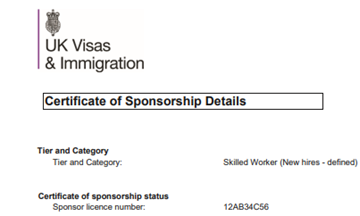The Challenges of Obtaining a CoS Allocation: A Strain on Businesses and Employees
Overcome Certificate of Sponsorship (CoS) Allocation Challenges

The ability to quickly and efficiently hire and retain top talent is a priority in the fast-paced business world. For UK employers relying on skilled workers from abroad, obtaining a Certificate of Sponsorship (CoS) allocation is vital.
However, recent trends have shown that securing a CoS allocation is becoming increasingly difficult, causing significant disruptions to business operations and employee well-being.
Understanding Undefined CoS vs. Defined CoS
Understanding the difference between Undefined CoS and Defined CoS is important for navigating the complexities of the CoS allocation process.
- Undefined CoS: This type of CoS is used for skilled workers who are already in the UK, for example, extensions, those looking to change sponsor/employer or visa category, such as students. It is allocated annually based on the employer’s anticipated need for the upcoming year. If an employer's initial allocation runs out, they can request an in-year increase from the Home Office. Theoretically, expediting these requests using the Home Office Priority Service is possible.
- Defined CoS: This type of CoS is required for skilled workers applying from outside the UK. Each Defined CoS is considered on a case-by-case basis rather than being part of an annual allocation. Unlike Undefined CoS, expediting the request for a Defined CoS using the priority service is impossible.
The Impact on Business Planning and Operations
Businesses aiming to hire new employees or extend visas for current workers increasingly find the Certificate of Sponsorship (CoS) allocation process a significant bottleneck. The standard processing time for requesting an in-year increase in CoS allocation can take up to 18 weeks, creating a lengthy delay that complicates workforce planning. Adding to the challenge, the Home Office frequently requests extensive documentation and additional information during the application process, further slowing down approvals and increasing administrative burden.
These delays can have serious repercussions. Without the necessary CoS allocations, companies are often forced to pause critical hiring decisions. This impacts immediate growth and productivity and undermines their ability to drive innovation, meet project deadlines, and stay competitive in their industry.
The uncertainty surrounding the allocation process adds another layer of complexity. Companies find committing to new projects or expansion plans challenging when their access to skilled talent remains unclear. This unpredictability doesn't just hinder operational efficiency; it can also directly impact the company's financial performance and long-term strategic goals.

Employee Stress and Retention Challenges
The difficulties in securing a CoS allocation are not just a burden on businesses; they also create a stressful environment for employees.
For workers who need to extend their visas, the uncertainty of the allocation process can be incredibly anxiety-inducing. Employees may worry about their job security and future in the UK, negatively affecting their performance and morale.
This stressful experience is particularly detrimental when onboarding new talent. Companies strive to provide a smooth and welcoming experience for new hires, but delays and uncertainties in the CoS process can leave a negative first impression. This can make it harder to retain top talent, as employees may seek more stable opportunities elsewhere.
The Home Office Priority Service: A Struggle for Expediency
Previously, there was a glimmer of hope in the form of the Home Office Priority Service, which allowed employers to expedite their Undefined CoS allocation requests for a fee of £350. This service aims to process requests within five working days, significantly improving the standard 16-week period. However, in recent times, this expedited service has become increasingly challenging to secure.
The Home Office Priority Service demand is extraordinarily high, with only 100 allocations available daily. These slots are claimed almost instantaneously, with the Home Office reporting they receive over 600 requests daily. This makes it extremely difficult for employers to use this faster processing option.
Even if an employer manages to secure a priority slot, sponsors increasingly face additional hurdles. Sponsors are now often required to provide extensive and complex documentation to meet the Home Office's stringent requirements. Understanding and fulfilling these requests can be daunting, adding another layer of difficulty to the process.

Planning and Seeking Professional Assistance
Given these challenges, employers are strongly advised to plan their CoS allocation needs as far in advance as possible. Anticipating demand for new hires or visa extensions can help minimise delays and reduce the risks associated with long processing times.
However, we understand that forward planning isn't always possible in today’s fast-paced business environment. When immediate solutions are needed, professional assistance can be invaluable in navigating the complexities of the CoS allocation process.
At Immtell, we provide a specialised service to secure priority CoS allocation slots, ensuring faster processing when time is critical. What sets us apart is our commitment: we only charge if we successfully obtain a priority service slot for you. Our expert team handles the application process, saving you valuable time and alleviating unnecessary stress.
To learn more about how we can assist you with your CoS allocation needs, please visit our Priority CoS Allocation service page or contact us.
LET IMMTELL SECURE YOUR PRIORITY COS ALLOCATION SLOT


Obtain Your CoS Allocation
Struggling with CoS allocation delays? Immtell's expert team is here to help navigate the challenges, secure priority slots, and keep your business moving forward.
Struggling with CoS allocation delays? Immtell's expert team is here to help navigate the challenges, secure priority slots, and keep your business moving forward.






